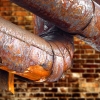RL Blogs

By John Reynolds of Inspectioneering.com
Nov 14, 2016The second article assessing the top ten reasons for FEMI failures leading to process safety incidents. |
||
| The ten reasons outlined are a result of doing 60+ FEMI audits within refineries and chemical plants in the last 45+ years. This also incorporates the tracking of 150+ serious FEMI incidents in the petroleum and petrochemical industry and their causes, and defending numerous clients in the industry from lawsuits pertaining to FEMI issues.
If you haven't read the first part of this series, please do so now. These two parts together consist of a highly abridged version of the full article on the subject that is coming up in a future issue of Inspectioneering Journal.
Let's discuss the final five reasons for significant fixed equipment mechanical integrity failures in the hydrocarbon process industry.
Reason #6: Inadequate implementation of guidance contained in the latest editions of industry codes and standards for FEMI
There are several dozen post construction (in-service) FEMI codes and standards that can help operating sites avoid many of their FEMI failures and process safety incidents. Too many small sites don't know about these valuable documents or they are too busy with the daily grind to apply the useful information found in them.
Most of these codes and standards are substantially updated at least every five years to recognize new methods and technology for inspecting and maintaining FEMI. Furthermore, application of the ANSI standardization process assures the user that they represent recognized and generally acceptable good engineering practices (RAGAGEP) for in-service equipment.
I'd highly recommend that you reference ASME PTB-2-2009 for an extensive list of applicable codes and standards from API, ASME, NACE, and several other standards development organizations. You can also refer to the codes and standards page on the Inspectioneering website to stay up-to-date.
Is your site applying the knowledge and work practices in all the latest editions of the industry post-construction codes and standards?
Reason #7: Inadequate or lack of organized programs for learning from previous FEMI incidents before they cause repeat failures
The vast majority (95%+) of FEMI incidents in the petroleum and petrochemical industry are a result of repeat failures. Sometimes the daily grind does not allow enough time to learn about how to avoid FEMI failures that continuously plague the industry. Even the records of FEMI incidents experienced within each operating site may be inadequate to pass on the previous lessons learned.
Intra-company and inter-company networking are necessary to learn about and apply the lessons from other FEMI failures. There are numerous sources for industry networking and lessons learned:
How well does your site apply the lessons learned from previous incidents in your plant, in your company, and within the industry?
Reason #8: Inadequate or lack of comprehensive FEMI record-keeping and data analysis
Record-keeping and data analysis (RK-DA) can be a mundane and boring part of the job for industry inspectors. At the same time, poor RK-DA can take a huge toll on the efficiency and effectiveness of the entire FEMI process. Poor RK-DA generally leads to poor FEMI results. Furthermore, there are legal reasons for optimizing RK-DA.
Watch out for GIGO (garbage-in, garbage-out) and Feeding the Beast syndromes, which have led to some serious incidents in the industry. Also, make sure your Inspection Data Management System (IDMS) is capable of doing everything that is needed to track, analyze, and report on the tons of FEMI data that are needed to avoid leaks and failures.
Is your site doing the best possible job at FEMI record keeping and data analysis to help avoid FEMI failures and process safety incidents?
Reason #9: Not using the best available technology for inspection and nondestructive examination (NDE)
There have been numerous new advances in inspection and NDE technology in the past 15 years. Advanced NDE may not be inexpensive, but it's much less expensive than a reliability and/or process safety incident from a FEMI failure.
Sites need the services of an NDE SME to help with:
Is your site making good use of the best available NDE technology to help find, size, and characterize potential FEMI damage mechanisms?
Reason #10: Insufficient FEMI training and knowledge transfer for all those involved in maintaining FEMI
Too many inspectors have inadequate FEMI knowledge and skills for this highly technical job in a modern hydrocarbon process plant. Unlike other equipment technicians/inspectors e.g. for instrumentation and rotating equipment, FEMI inspectors don't get much training before becoming a fixed equipment inspector. To compound this, the body of knowledge of the FEMI inspector comprises 15+ distinct subject matters in order to provide the skills for handling all of the elements of FEMI.
It is clear that both classroom and systematic/organized on-the-job training are needed. Simply passing the basic API certifications (510/570/653) is not enough.
Are your FEMI inspectors sufficiently knowledgeable and skilled in the entire body of knowledge necessary to avoid FEMI failures?
Summary Comments
I can't stress this point enough: corrosion, cracking, embrittlement, ruptures, and leaks are not the primary causes of FEMI failures - inadequate FEMI management systems are. If robust management systems for these top ten FEMI issues were created, implemented, and maintained, most FEMI process safety incidents would not occur.
As the saying goes: "This is not rocket science." These are systems and work processes that can successfully avoid most FEMI failures. However, the mere existence of these management systems is not enough; they need to be robust, high quality, and sustainable in order to achieve excellence in FEMI.
Remember, just seeking compliance and "checking the box" doesn't avoid the potential for big FEMI incidents.
See Also
| ||
|
|

.png)
.png)








